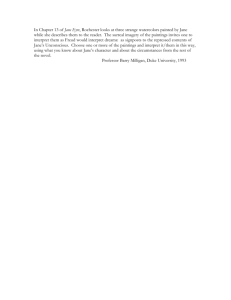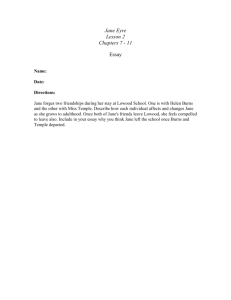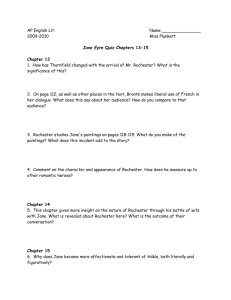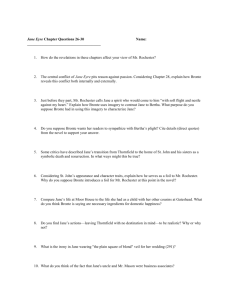9366,"allusions in jane eyre",6,4,"2000-11-19 00:00:00",90,http://www.123helpme.com/view.asp?id=23080,4.9,55900,"2015-12-24 14:28:41"
advertisement
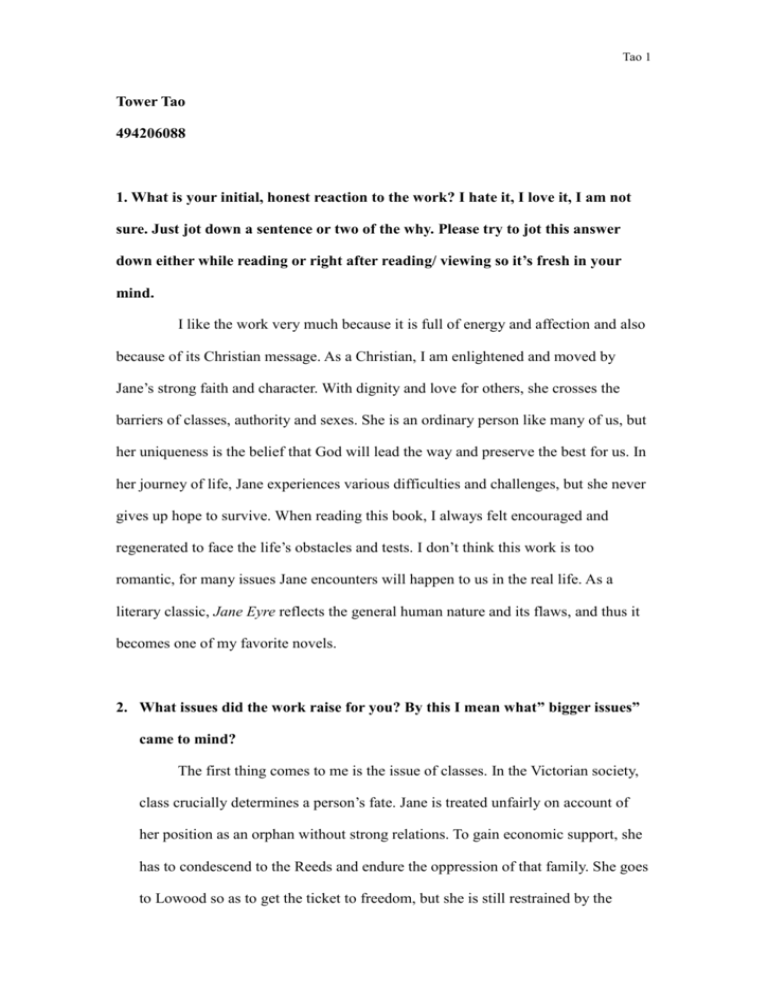
Tao 1 Tower Tao 494206088 1. What is your initial, honest reaction to the work? I hate it, I love it, I am not sure. Just jot down a sentence or two of the why. Please try to jot this answer down either while reading or right after reading/ viewing so it’s fresh in your mind. I like the work very much because it is full of energy and affection and also because of its Christian message. As a Christian, I am enlightened and moved by Jane’s strong faith and character. With dignity and love for others, she crosses the barriers of classes, authority and sexes. She is an ordinary person like many of us, but her uniqueness is the belief that God will lead the way and preserve the best for us. In her journey of life, Jane experiences various difficulties and challenges, but she never gives up hope to survive. When reading this book, I always felt encouraged and regenerated to face the life’s obstacles and tests. I don’t think this work is too romantic, for many issues Jane encounters will happen to us in the real life. As a literary classic, Jane Eyre reflects the general human nature and its flaws, and thus it becomes one of my favorite novels. 2. What issues did the work raise for you? By this I mean what” bigger issues” came to mind? The first thing comes to me is the issue of classes. In the Victorian society, class crucially determines a person’s fate. Jane is treated unfairly on account of her position as an orphan without strong relations. To gain economic support, she has to condescend to the Reeds and endure the oppression of that family. She goes to Lowood so as to get the ticket to freedom, but she is still restrained by the Tao 2 institutional power, failing to express her true feeling and emotion. Moreover, the problem of class difference emerges very often when she works for Mr. Rochester. As Mrs. Fairfax says that one cannot converse with servants “on terms of equality,” it’s not hard to imagine how unequally the low-class members are dealt with. In the book, we witness the gap between lower and upper classes. For example, Miss Ingram and her mother have a biased mind against tutors, presenting the Victorian values about rank and wealth. Most obviously, when Jane leaves Rochester for Whitcross, she is penniless and destitute at the edge of death. Therefore, economic and birth constitute the power relations of classes. Another issue is gender. In Charlotte Bronte’s days, women are both socially and sexually inferior to men. Either Rochester or St. John displays the Victorian male arrogance and pride. Rochester, as a gentleman with a high social rank and financial fortune, disregards his wife Bertha and his (step) daughter Adele, doing wife hunting as much as he wants. As for St. John, his ideal wife is a patient and submissive wife. He keeps forcing Jane to consider being his partner as a wife to India for missionary, regardless of her will. In terms of women, they are sometimes stereotyped as object of beauty or of weakness. Miss Ingram represents the former, who seems to care only about her pretty face and winning her lover’s heart. On the other hand, Bertha is a victim of this system of patriarchy, and her mentally illness becomes the cause of her death. Jane is no exception, but she becomes equal to Rochester when receiving the heritage from her uncle, as Rochester says, “Are you independent? A rich woman?” Furthermore, there has been a postcolonial discussion about Bertha Mason’s existence since the discussion in The Mad Woman in the Attic. The anti-imperial discourse has centered on Bertha’s identity as a colonized woman who is victimized in the white settler’s world. The racial difference could be a major Tao 3 reason why Bertha is excluded and marginalized, as Rochester says, “I found her nature wholly alien to mine; her tastes obnoxious to me; her cast of mind common, low, narrow, and singularly incapable of being led to anything higher.” Anyhow, I don’t want to over-emphasize the white anxiety against the colored people, for I believe that Bronte supported the antislavery movement, and she did not wish to demonize the colonized women. 3. a. For the novels: How much difficulty did you have with the language? How about the plot. Did it confuse you at all? Bronte’s flair for wring not only makes the novel readable but also enjoyable. Although she puts much investment in details and description of nature, the language is not difficult and so is the plot. The relationships among characters are complex, but Jane’s monologue always helps the reader to follow the line of the story. b. Or for the films: Could you understand the language when spoken? Did you have to rely on subtitles where available? (A shame if you do, but I understand.) Also, could you follow the plot? The language of Orson Welles, who plays Rochester in Stevenson’s film, bothers me much than the other characters. He has a low voice as Elvis Presley’s, but sometimes he talks too fast, and hence makes me feel lost. In that case I have to rely on the subtitle. I need to practice my listening to the old film, because the black and white film is more difficult to understand, owing to its old age and old language. Between the two, I prefer Zeffirelli’s film because it is made in a modern way which I have been used to. Generally, there are not tremendous changes from the original text in both Stevenson and Zeffirelli movies, and hence it is quite easy to follow the plot. 4. After thinking about the work, perhaps discussing it on the BBS or chat room or looking at the materials I provide, how have your perceptions changed if at Tao 4 all? After the person to person class in Fu Jen, I realize that Jane Eyre is not simply a feminist novel, but it is also a Christian book. According to this, I pay more heed on the Christian messages in the book. At first, I was very surprised why some earlier people regarded it as an immoral novel. Yet, considering the value of morality and love in the Victorian society, I can understand Rochester’s love affair with Jane might not be allowed. However, throughout the book we can find many biblical allusions and Jane’s own experiences of religion. As for the reason that I’m now taking the course Bible as Literature, I am very interested in how writers are inspired by religion. For example, the case of James Joyce, to some extent, would be very different from that of Charlotte Bronte. Moreover, it is important that Jane is not a victim of patriarchal system, at least at the end, and her decision to marry Rochester--- the one who hurts her most, is completely out of true love. Jane, unlike Miss Ingram, doesn’t marry him for economic consideration, but for an equation of both sexes. In sort, I agree with Micael M. Clarke’s article “Brontë’s Jane Eyre and the Grimms’ Cinderella” that the conclusion of the book is “a clear assertion of loving sexual union.” 5. What other supplementary materials have you looked at to help with your understanding of the work in question (books, journals, websites, etc) Please be specific. How have these materials helped you? Did you find something really interesting you’d like to share with me or your classmates? Please give me the information so I can pass it on. Jon Buchan’s essay “‘Jane’s all White’: An Examination of Victorian Chromatic Anxiety in Bronte’s Jane Eyre” is helpful for me to understand the colonial images in this Victorian novel. He even discusses that Helen Burns and St. John Rivers view the non- European nations as barbarous and uncivilized. He Tao 5 suggests that St. John is an “allegorical figure, signifying both Christ on the cross, and the white man’s burden in empire.” In his eyes, St. John’s mission in India could be also an imperial intrusion. It is an interesting point that Christianity is a cultural hegemony, but I think we should give more respects on St. John because he scarifies his own happiness only to fulfill God’s plan. With background materials and the lecture on the class, I learn that the book not only contains a romantic story but also many allusions of fairy tales and Judeo-Christian religious tradition lying in the book. For instance, the Bluebeard Tale and Beauty and the Beast are informed to suggest Rochester’s perverse psychology. 6. What other questions does the work raise for you? What ideas does it spark in your head? I have many concerns about what happens to Adele after the story ends. Except Jane, no one ever cares about her feeling. As a French little girl, she is culturally displaced in England and to give up her mother tongue. Moreover, she is sent away to a boarding school, leaving her step parents. Is she happy or sad about her fortune? It will be an interesting topic about what is going to happen to Adele from a feminist perspective. 7. For the films: after your initial viewing of the film, what do you think of it compared with the written play? Did you like it/hate it/ get thrilled by the actors/ the setting, whatever? Be honest. Zeffirelli’s Jane Eyre is much closer to the original text than Stevenson’s, and hence I prefer his redaction of the book. Zeffirelli’s Jane is just like my imagination for her in the book. She is both very rational and passionate, and she looks plain and modest as Bronte’s Jane. On the other hand, Stevenson’s Jane, whose exaggerating acting seems unnatural to me, is too beautiful as the heroine in the novel. When Tao 6 watching Zeffirelli’s film, I could not help being touched by the love between Rochester and Jane. Both the actor and actress deal with the love relationship carefully and sincerely, and thus there is no Hollywood erotic thriller that makes me feel gorge. I don’t like Stevenson’s film as much as Zeffierlli’s because his abridgment of the work undermines Jane’s strength of character. As a matter of fact, he deletes many crucial events of the story, and fills in with his own elements. Unlike Stevenson, Zeffierlli keeps the character St. John as a foil to Rochester, even though he makes subtle nuances on some settings. Fortunately, he does not impair the feminism in the original work, sufficiently showing Jane’s struggle with herself and the world. Anyway, both directors have their own positions toward the work, and I respect their interpretations. Nevertheless, neither of them can replace Charlotte Bronte’s work. The reason why Jane Eyre becomes an eternal work of art is that it transcends its own time, and leaves a lot of room for the readers to talk about.
